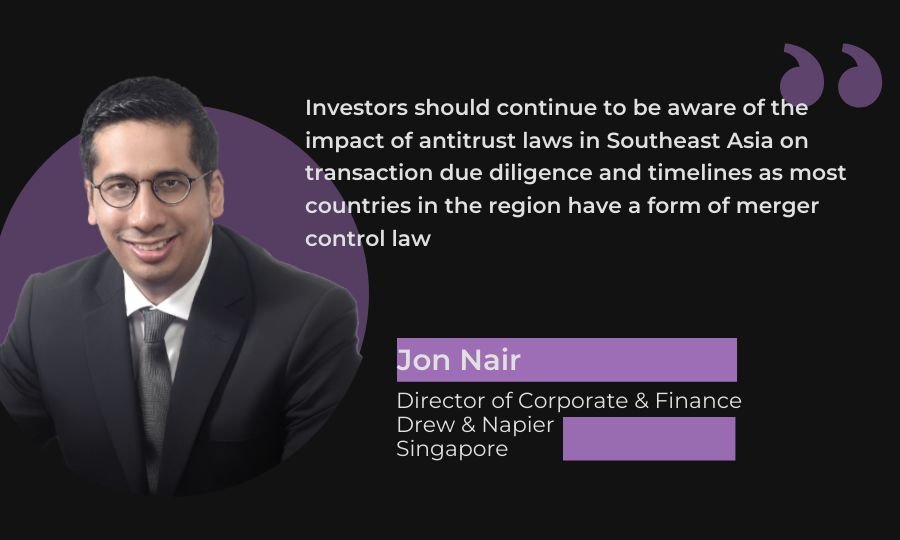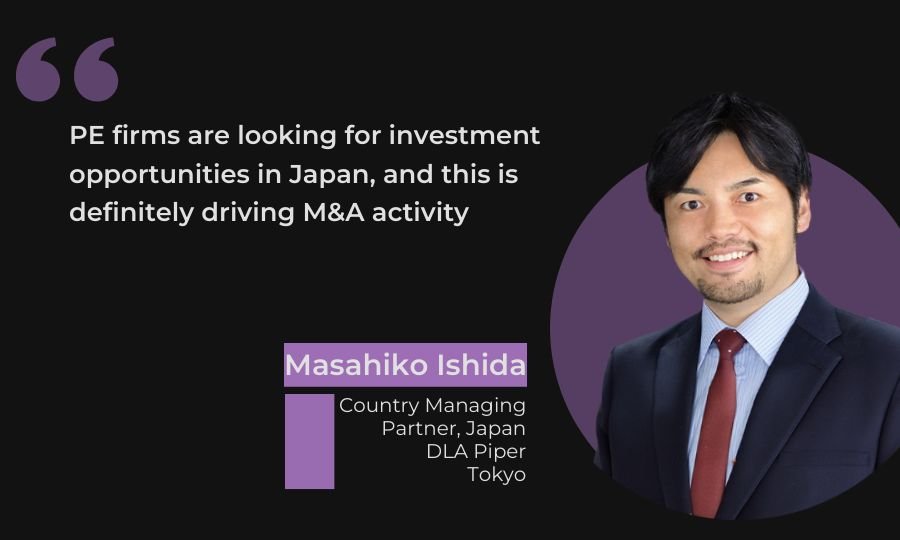After a long lull in investment activity, M&A deals are picking up across Asia. Vandana Chatlani reports
In a region that has so often been attractive for its growth opportunities, M&A has recently seen a quiet spell. In the first half of 2024, deal volumes and values in the Asia-Pacific decreased by 23% and 35%, respectively, compared to the first half of 2023, according to an analysis by PwC.
Private equity movements have also taken a hit. Hesitant to move forward with new projects on account of sluggish economic growth, high interest rates and geopolitical tensions, Asian private equity funds raised USD100 billion in 2023 – the lowest figure in a decade, according to Bain & Company.
Things are looking brighter
“The number of announced Southeast Asia M&A deals in the first five months of 2024 was relatively muted, but there has been an increase in preparatory sell-side steps being taken by financial sponsors in anticipation of more favourable economic conditions, and stable to lower interest rates,” says Jon Nair, director of corporate and finance at Drew & Napier in Singapore. “This is likely to translate to a higher number of M&A deals in the mid to later part of 2024.”


Activity in Japan has also been encouraging. “So far in 2024, M&A activity in Japan has been robust, with private equity transactions being particularly active,” says Ken Lebrun, a Tokyo-based corporate partner at Davis Polk. “You also see ambitious Japanese companies such as Nidec and Dai-ichi Life taking advantage of corporate governance reforms and the METI’s [Ministry of Economy, Trade & Investment] newly published takeover guidelines by commencing unsolicited takeover offers. There have been several significant outbound deal announcements and we are seeing an increasing pipeline of such deals.”
Keeping the ball rolling
While a wait-and-see approach may have been a dominant theme in the past year, some Asian investors continued to hunt for opportunities domestically, regionally and internationally in growing sectors such as healthcare, technology, infrastructure, energy, financial services and retail, among others (see M&A tracker HERE).
In December 2023, Malaysia’s Gentari snapped up 49% of Toronto-based Northland Power’s ownership in the Hai Long offshore wind project located in Taiwan. The companies will share in the value creation of offshore wind power, while supporting Taiwan’s transition to renewable energy. Northland retains a 30.6% ownership interest and will continue to take the lead role in Hai Long’s construction and operation.
Capitalising on opportunities in healthcare, Singapore’s Thomson Medical Group forked out USD381.4 million to purchase FV Hospital in Ho Chi Minh City, a deal touted as the largest hospital acquisition in Vietnam’s history.
The acquisition “expands our presence to cover three of the region’s most important geographies in healthcare, giving us access to a flourishing market and a deep bench of talent, while providing critical inroads into neighbouring countries like Cambodia, Laos and Myanmar,” said Thomson Medical’s executive vice chairman Kiat Lim in a press release.
In March, Japan’s Sumitomo Life Insurance Company upped its stake in Singapore Life Holdings, making it a wholly-owned subsidiary as it bought out existing shareholders in a USD780 million deal. Sumitomo regards Singapore as a key market and gateway to fulfilling its wider expansion plans in Asia.
Not all the action was concentrated inbound. Asian appetite for overseas investment saw South Korean asset manager Mirae Asset Financial Group acquire Sharekhan, India’s ninth-largest brokerage firm, last December following a bidding process. The same month, Tokyo Gas announced its purchase of Texas-based Rockcliff Energy II for USD2.7 billion to increase its overseas reach in natural gas markets. Tokyo Gas purchased Rockcliff from private equity firm Quantum Energy Partners.
In March, Taiwan’s Bora Pharmaceuticals completed its acquisition of Minnesota-based generics manufacturer and marketer, Upsher-Smith Laboratories. The deal gives Bora its first US manufacturing site, and will deepen Bora’s product portfolio and global distribution channels.
Meanwhile, in April, Japan’s Sekisui House, through a subsidiary of its US business controlling company, completed its acquisition of MDC Holdings, a leading homebuilder in the US.
“The demographic issues facing Japan are galvanising Japanese companies across almost all industry sectors to focus on outbound investment,” says Lebrun. “The rapidly ageing and declining population means that companies in industries ranging from consumer products and food and beverage to insurance, asset management, manufacturing and home-building all need to invest overseas for growth.”
Domestic consolidation across sectors has also been a trend in Asian markets.
Last October, Korean beauty and cosmetics company Amorepacific acquired an additional stake in hypoallergenic skincare brand COSRX, giving it 93.2% ownership and making COSRX a subsidiary.
In November 2023, Malaysian conglomerate Sime Darby announced that it would sell its interest in Ramsay Sime Darby Health Care to Malaysia’s Columbia Asia Healthcare for USD1.2 billion.
In December 2023, Thailand’s WHA Corporation signed an agreement with PTT Global Chemical to purchase 50% of GC Logistics Company, strengthening its foothold in the logistics sector.
And in January, AREIT, the Philippines’ first and largest real estate investment trust (REIT), paid out PHP1.19 billion (USD20.23 million) to buy the Seda Lio hotel in El Nido, Palawan province. The acquisition was part of a bigger PHP30 billion infusion of prime commercial assets into AREIT.
“The key to a successful REIT is to constantly infuse accretive properties to ensure continued growth for stakeholders,” says Chingkay Martirez-Cruz, head of legal, chief compliance officer and assistant corporate secretary at AREIT. “This year’s infusion is the fourth property-for-share swap by AREIT since its IPO in 2020.”
Given the various regulatory approvals needed for a property-for-share swap, Martirez-Cruz says: “Building a partnership with regulators is critical; from advice on structuring deals beneficial to investors, to ensuring that acquisition timelines are met, thereby guaranteeing a steady income and dividend declarations to shareholders.”
Roadblocks and green lights
Activity across the board looks set to be strengthening in the coming months.
“We have experienced a noticeable uptick in M&A in the region in Q2 and the pipeline looks good, particularly private capital-related and in global sectors like healthcare, and energy and infrastructure,” says Simon Cooke, a partner at Latham & Watkins in Hong Kong who focuses on pan-Asia private equity transactions. “Digital infrastructure continues to prove especially attractive to large asset managers, pension funds and strategic investors.”


Cooke is also reassured by the return of market auctions. Both the Bora-Upsher-Smith deal and Mirae-Sharekhan acquisition involved numerous bidders. “Many processes are still relatively bespoke in terms of bidder engagement and timelines, but it’s encouraging for market participants, particularly the private equity funds needing exits for their investors or sitting on significant dry powder, that auction activity is picking up.”
Of course, regulatory landscapes vary across Asia and navigating these frameworks will be crucial to the success of any transaction. Throughout the region, there has been a mix of regulatory and legislative change – a relaxation on foreign ownership restrictions on the one hand, and a tightening competition regime on the other.
“Investors should continue to be aware of the impact of antitrust laws in Southeast Asia on transaction due diligence and timelines, as most countries in the region have a form of merger control law,” says Nair. “Malaysia is in the process of amending the Malaysia Competition Act 2010 to introduce a merger control regime.”
Many countries are also working to create clearer and more consistent regulatory structures to earn credibility and sweeten investment propositions.
In January, the National Assembly, Vietnam’s highest state administrative body, passed the amended Law on Land. This came shortly after the country approved new laws on real estate business and housing in November last year.
These three new laws, which are scheduled to take effect on 1 January 2025, seek to put in place more progressive and transparent land management practices through improvements to land valuation processes, extended lease periods and strengthened dispute resolution mechanisms, among other factors.
The new Land Law also aims to simplify land use categories and procedures, offer greater flexibility on the types of land use permitted for foreign-invested enterprises, and create alignment with global environmental and social governance standards.
These revisions have the potential to enhance foreign investment activity across sectors such as manufacturing, real estate development and infrastructure, where increased stability and predictability are essential to long-term project commitments. Of course, teething issues are to be expected, especially in terms of how the new law will apply to ongoing projects. Consistency of implementation across the country will determine how successful the amendments will be in practice.
In Singapore, investors should take note of the Significant Investments Review Act 2024 (SIRA), “which regulates investments into and control over entities critical to Singapore’s national security interests,” explains Nair. “As a result of the SIRA, local and foreign investors into certain designated entities will be subject to ownership and control-related obligations including notification and approval requirements.”
This is not necessarily a cause for concern, notes Nair, as the SIRA does not generally restrict foreign direct investment into Singapore and is not expected to affect M&A activity in the country, or in relation to holding companies incorporated in Singapore that hold Southeast Asia-focused businesses.


In May, Japan’s Diet (parliament) passed a bill amending the Japanese Securities Act. “Under the amended law, which will take effect sometime early in 2026, any shares purchased on the stock market that result in a shareholder holding more than 30% of a company’s shares will trigger the mandatory application of TOB [takeover bid] rules,” says Masahiko Ishida, country managing partner for Japan at DLA Piper. “This is to ensure the transparency and fairness of transactions that have a significant impact on the control of a listed company.”
Picking up speed
Despite the regulatory shifts and market realities, analysts remain hopeful about an uptick in deal-making in the latter half of 2024, particularly in resilient industries such as energy transition, digital transformation, environmental sustainability, technology and healthcare. Companies exploring these areas are likely to chase acquisitions to secure critical assets and build more robust product portfolios.
Access to financing will also determine how buyers move. “A large part of the recent buy-side M&A activity in Southeast Asia has been driven by cash-rich strategic investors given their lower dependence on external debt to finance their deals,” says Nair. “If interest rates stabilise, it is likely that private equity firms, which have raised substantial funds from their investors in the past few years, will be a significant driver of investment activity.”
Ishida also expects private equity firms to continue competing for assets in Japan. “The listed companies’ portfolio management and carve-out transactions are driven by various factors, such as pressure from the strong corporate governance request by stakeholders and investors, or the Tokyo Stock Exchange’s statement on price book value ratio,” he says. “PE firms are looking for investment opportunities in Japan, and this is definitely driving M&A activity. Together with the above factors, we expect PE activity in Japan to increase.”
Investors may also be pleasantly surprised with shifting cultural norms at the company level as they assess new targets for purchase.
“In the past, a common complaint about Japanese companies was that they were not able to move quickly enough to participate in a standard international sales process, or to satisfy a typical international counterparty,” explains Lebrun. “I believe that many Japanese companies have made significant progress on this front, both by developing their internal talent by engaging in more frequent domestic and international M&A, and also by hiring external talent for key positions in their corporate development and legal functions.”
The changing role of a general counsel has contributed immensely to the closure of deals in the region.
General counsel are no longer relegated to the sidelines and considered a support service on which to rely when problems arise, says Martirez-Cruz. “In-house counsel are now more ingrained in the organisation,” she says. “They are evolving from being pure enforcers of legal, regulatory and compliance requirements, to becoming integral business partners. At AREIT, the legal team sits at the table from planning to implementation to the post-execution stage.”
Martirez-Cruz acknowledges that external counsel contribute to strategy and project development, and provide insights in a variety of fields from finance and operations to regulatory, marketing, communications, and investor and stakeholder relations.
“General counsel likewise drive change and ensure businesses are sound by institutionalising good corporate governance practices and aiding in mitigating risk factors,” she says. “With the surge of AI and more accessible information, it is expected that general counsel will play an even bigger role in organisations, and that the practice will not be purely one of law, but a more interdisciplinary field.”

